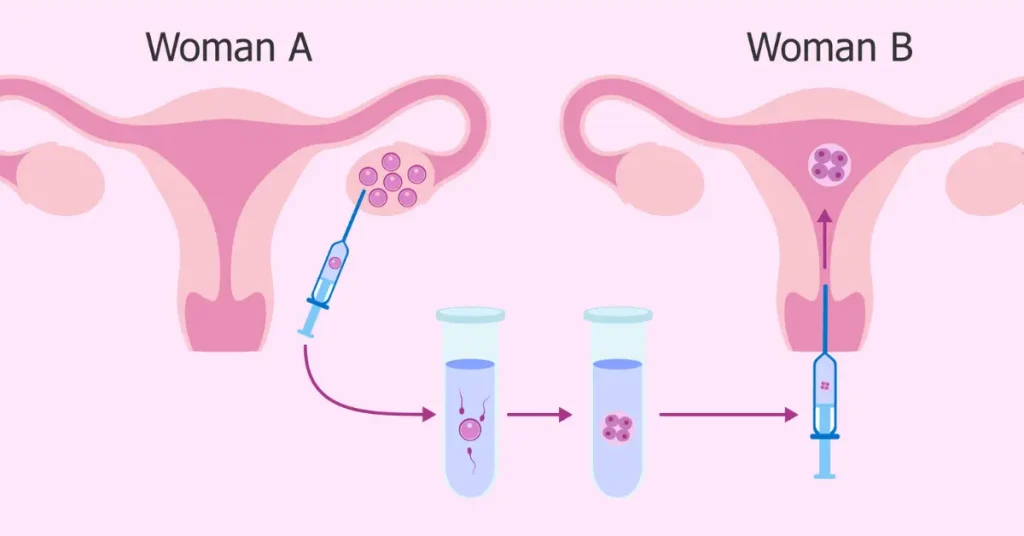Hey there! If you’re reading this, you might be exploring different ways to build your family. It’s not always easy, and that’s okay. Many couples face challenges when trying to conceive naturally. IVF and surrogacy are two popular assisted reproductive options that help thousands of people become parents every year. While both methods can help create families, they work in very different ways.
What Is IVF and How Does It Work?
Both of these represent different paths to parenthood, but let’s start with in vitro fertilization (IVF). This procedure helps when couples struggle to conceive naturally. During IVF, doctors collect eggs from ovaries and combine them with sperm in a lab dish. Pretty amazing, right?
The fertilized eggs become embryos that doctors transfer into the woman’s uterus. Many people don’t realize that IVF typically involves multiple steps. First, you take medication to help your ovaries produce eggs. Then comes the egg retrieval, fertilization in the lab, and finally, the embryo transfer. The whole process takes about 2-3 months per attempt. For many couples dealing with fertility challenges, IVF offers a chance to have a biological child.
What Is Surrogacy And How Does It Work: Types and Process
When talking about IVF and surrogacy options, it’s important to understand what makes surrogacy unique. It involves another woman carrying a pregnancy for intended parents. This option helps when someone can’t carry a pregnancy themselves.
The surrogate receives an embryo through transfer and carries the baby until birth. Throughout the pregnancy, she attends regular checkups while staying in contact with the intended parents. Many surrogates report feeling joy in helping others create families. The journey takes about 15-18 months from start to finish, including finding a carrier, medical screenings, and the pregnancy itself.
Gestational Surrogacy vs Traditional Surrogacy
When exploring IVF and surrogacy, you’ll encounter different types of arrangements. Here’s what you should know:
- Gestational is most common today. The carrier has no genetic connection to the baby.
- Traditional involves the carrier using her own egg, making her genetically related to the child.
- Agency vs. independent arrangements differ in how matches are made.
- Altruistic arrangements involve carriers who help without compensation beyond expenses.
- Domestic vs. international options have different legal processes.
Most modern arrangements use gestational surrogacy to create clearer boundaries. This approach helps everyone feel more secure throughout the journey.


IVF vs Surrogacy: Which Treatment Is Right for Your Fertility Journey?
Choosing between IVF and surrogacy depends on your specific situation. In vitro might work best if you can physically carry a pregnancy but struggle to conceive naturally. This helps with issues like poor sperm quality, blocked fallopian tubes, or unexplained fertility problems.
Carriers become necessary when pregnancy itself isn’t possible. This includes women without a uterus, those with serious medical conditions, or same-sex male couples. Sometimes people try multiple in vitro cycles without success before considering a gestational carrier. When comparing IVF and surrogacy, think about your medical situation, timeline, and personal preferences.
Talk with reproductive specialists to determine which path makes sense for your family-building journey. Remember, both options have helped countless families welcome children when traditional methods weren’t possible. The right choice is whatever works best for your unique situation.

FAQ
What is in vitro fertilization?
In vitro fertilization is a lab procedure where eggs and sperm meet outside the body. Doctors retrieve eggs, combine them with sperm in dishes, and transfer resulting embryos to the uterus. This helps couples overcome various fertility challenges.
What is the difference between surrogacy and IVF?
With in vitro procedures, you carry your own baby after fertilization happens in a lab. With a gestational carrier arrangement, another woman carries the pregnancy for you. The main difference is who physically experiences the pregnancy.
What type of surrogacy is right for me?
Gestational arrangements use your embryo in another woman’s womb, creating no genetic link between carrier and baby. Traditional arrangements use the carrier’s egg, creating a genetic connection. Your medical needs and personal comfort determine which path works best.















